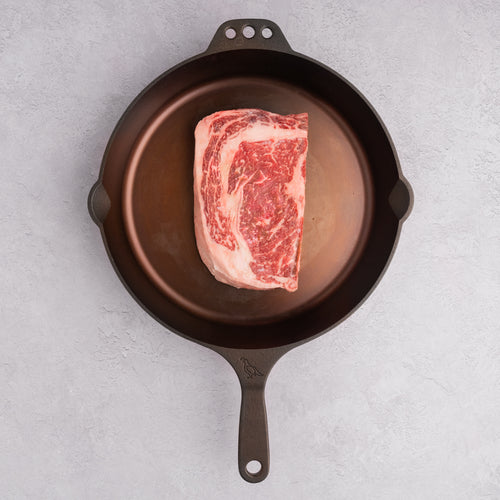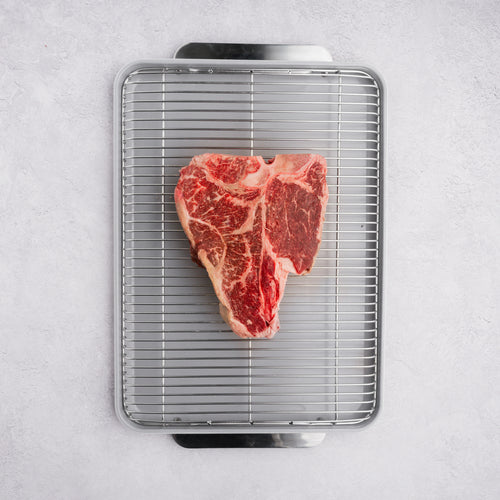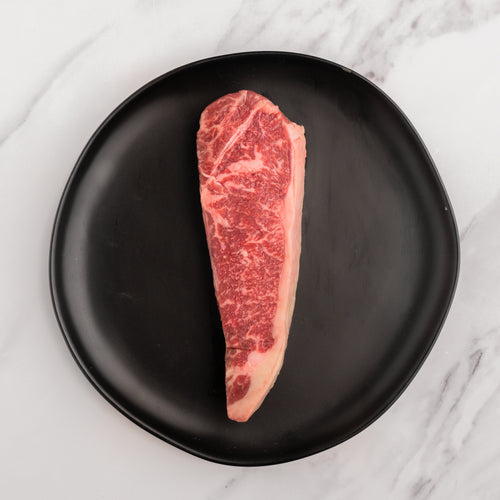
Healthy Fat and American Wagyu Beef: Too Good to Be True?
Get the lowdown on the surprising way Snake River Farms American Wagyu beef can be a heart-healthy addition to any diet, even if it sounds too good to be true.
Few food choices are both delicious and good for you. Avocado ranks up there, as do salmon, blueberries and dark chocolate.
Would you add steak to that list?
What if we told you that peer-reviewed research studies have compared American Wagyu beef to avocado and salmon in terms of so-called healthy fat?
It sounds too good to be true. We know.
But the truth is that Snake River Farms American Wagyu beef is a delicious, nutritious source of oleic acid, a type of fatty acid that has been shown to lower bad cholesterol levels and raise good cholesterol levels.
Got questions? We did too. So, we dug around and got the lowdown on different types of fat, how they affect cholesterol levels and where they show up in your family’s diet.
Here are some surprising answers we found:
What, Exactly, is a "Healthy" Fat? Isn't Fat Bad for You?
It was the mantra among dieters and doctors for decades: Fat makes you fat! Don’t eat meat — eat grains! But study after study has linked high-carbohydrate diets to obesity and diseases like diabetes, whereas the connection between eating fatty foods and developing heart disease is murkier. A closer look indicates there is more than one kind of fat in our diets, and some treat us better than others.
- Monounsaturated fatty acids — aka MUFAs — Long maligned as the culprit in heart disease cases, these types of fat have recently been recast as mediators of cholesterol levels, boosting the body’s metabolism of lipids and helping maintain fat levels in cardiac muscles.
- Polyunsaturated fatty acids — aka PUFAs — These are considered “good” fats, like linoleic acid, that can lower overall cholesterol levels.
- Saturated fatty acids — aka SFAs — Doctors have long associated SFAs with high cholesterol and heart disease, often recommending eliminating them from your diet altogether. But recent research reveals at least one, oleic acid, that got a bad rap by association.
Okay, So What Does Heart-Healthy Fat Do?
Quick primer on cholesterol numbers:
-
Low-Density Lipoproteins (LDL) make up what we call “bad cholesterol” because it can clog arteries and cause cardiovascular problems.
-
High-Density Lipoproteins (HDL) are the “good” type that absorb fat, escort it to the liver and help expel it from the body.
The so-called good fat found in avocado, salmon and Wagyu beef is heart-healthy in two ways. It can either lower or not affect LDL levels, and it can raise or not affect HDL levels. The lowering and raising are important, as those powers mean including these foods in your diet can help keep a healthy balance and reduce your risk of some heart diseases. Oleic acid is one of these white-hat SFAs that help keep cholesterol in check.
Does This Mean That All Meat Is Suddenly Good For You Now?
Not exactly. Researchers were careful to point out that not all beef is created equal. All Wagyu, including pure Japanese cattle and crossbred American Wagyu cattle, has a genetic predisposition for producing high levels of oleic acid.
The oleic acid flourishes in Wagyu cattle through its marbling. The internationally recognized Beef Marbling System grades beef by the amount of intramuscular fat it has — aka the white streaks and flecks peppered through the muscle, not the solid white chunks between the muscles, which is called intermuscular fat. The BMS assigns a number from 1 (essentially none) to 12 (exceptional) to all beef as an indication of how marbled it is.
To give you some perspective, USDA Prime scores a BMS of 4 or 5, whereas Snake River Farms Gold grade steaks deliver a BMS of 9 or higher, and incredibly expensive Japanese Wagyu scores a 12.
Is American Wagyu the Only Option For a "Healthier Steak"?
For now, the research indicates that only Wagyu cattle and all their genetic descendants produce exceptional marbling, which means healthier fat content than any other breed. One note the study included was that, while Wagyu are particularly adept at transferring their genetic awesomeness to future generations, there is hope for other breeds. Feeding cattle a rich, grain-based diet slowly over an extended period of time seemed to produce high levels of oleic acid in the muscle tissue. That means the healthy, humane and sustainable practices at Snake River Farms not only help create a nutritious part of your family’s diet — they also make us a model for the rest of the industry to learn from and emulate for a future of better beef, better health and a better planet for all of us.







